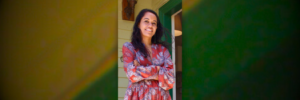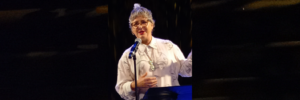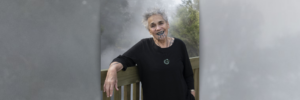
Jessica Hinerangi Thompson Carr is of Ngāti Ruanui, Ngāruahine, Ngāpuhi and Pākehā descent. Born in Ōtepoti, she has a degree in English and art history with a masters in Māori ekphrastic poetry. She is a poet, journalist and illustrator, working primarily on Instagram under the name @maori_mermaid, with an incredible following. Her previous work has appeared in Landfall, Starling, The Big Idea and The Pantograph Punch. Her first collection Āria was launched last week, published by AUP.
Congratulations Jessica on the release of your hotly anticipated collection Āria! What was the driving force behind creating & publishing Āria?
Thank you so much! Āria was originally written as a release for myself and my loved ones, to make some sense of what I’ve been feeling growing up disconnected from my Māoritanga, then venturing into reconnection and learning. I had to get these poems out of my tinana onto a page. It was then published to be an awhi and an example for others who may feel similar feelings, frustrations, and hopes, to perhaps give them an idea of where to place those feelings.
Sometimes writers talk about their book as if it is something they’ve birthed – a struggle as well as a gift. If you were to think of your book this way, which books are its whanaunga?
I would regard pukapuka like Whai by Nicole Titihuia Hawkins, Poūkahangatus
by Tayi Tibble, Tōku Pāpā by Ruby Solly, and Ransack by Essa May Ranapiri as the whanaunga of Āria. These pukapuka inspired me so much and fuelled my fires of creativity while I was writing. I would also include the Puna Wai Kōero anthology edited by Reina Whaitiri and Robert Sullivan- specifically the Keri Hulme and Witi Ihimaera section.
Your pukapuka has been described as a rongoā for those beginning their reconnection and reclamation journeys. To what extent was the writing process a rongoā for you?
It was all rongoā 100% of the time. Writing these poems was healing. Digging into old and new truths about myself, my whakapapa, the world, was really good for me. Putting them out to be read by others is also a rongoā. Maybe not the yummiest one to take, I feel a bit ill sharing them, but I know it will be ok because I can learn from whatever critiques and reviews may come, then grow.
You spend a lot of time travelling the rohe in your Māori Mermaid-ified Van. Can you tell us about your writing process whilst travelling? To what extent is your writing process determined by where you are?
I would write a lot as a passenger princess (I can’t drive yet I’m scared haha) so I did a lot of writing while we were moving between whenua. Being on whenua where either my tāne has whakapapa or I do, or neither of us do, definitely impacts the tone and themes in my writing. For example, Pretty Pūngāwerewere was written while we were in Taranaki, after walking a track to Waingongoro hut, Koro was written while we were in Twizel where my own koro lived all my life, and Land Back poem was written while we were at the occupation of Pūtiki Bay. Some whenua we would feel agitated on, some energised us. I would always try to listen to the messages and tohu and if I felt like writing, the whenua would absolutely dictate the temper of the words I put out.
What do you think your tīpuna would think of your book? What would their reactions be?
Probably something like “good job now go do something productive like make babies” haha! I reckon most of them would be proud, and some of them might be giving a stink face… but it’s all aroha. It’s all growth and they probably see it as a nice shiny little dot in the wide web of our time here.
What did it feel like the moment you found out your book would be published?
Like the beginning of a really scary cool thing… a very grown-up thing… I was excited to know I was going beyond posting my creativity on Instagram or submitting to journals hoping for the best, expecting the worst. It felt like the natural next step.
What other artforms influenced you while writing this book?
Music and paintings, trips to the Dunedin Public Art Gallery and the Auckland Public Art Gallery, Instagram artists and poets, and taonga pūoro.
If Āria had a soundtrack what would be on it?
Ok I’ve given 3 songs to NZ Booklovers Q&A and I totally wanted to give more, so adding on to the ones I told them I would choose:
Hinemoana – Pūoro Jerome
Hine E Hine – St. Joseph’s Māori Girls College
Force – Nahbo
Pokarekare Ana – Howard Morrison Quartet
Who Do You Think You Are – Spice Girls
What are your dreams for this book?
To comfort and guide other reconnecting Māori. To inspire other Māori who may not have known they were poets to write their own poems. To remind anyone who reads it to unpack their whakapapa, where they’ve come from and where they’re going. I wanted Āria to show a progression, a development, from a rattled, insecure, rather messy voice, to a more centred, confident voice. Perhaps this voice could influence another unsure person, and carry them through to be more confident in themselves. As you read further into the pukapuka, the poems grow more certain, maybe more mature… I want this to be an example for those readers who are going through it, to show them where you can take your identity crises- take it to the moana and the ngāhere, take it to the Atua, take it to your whānau, and find a way to focus on your mahi, focus on seeing yourself as part of things that grow instead of a broken heart. Honestly, I know this is a very beginner pukapuka. I have a long way to go in terms of my growth as a writer. I wouldn’t mind if someone read Āria and felt a fire light under their nono, felt like they could write a better book, and do it.
What tips do you have for Māori writers wanting to build their online community?
Engage in the online kōrero, comment and share other creatives’ posts, tautoko what they make, and share your mahi despite your fears. There is a time and place for perfectionism, but if you strive for perfect all the time online you won’t ever share anything. Just be your authentic self, be generous with your mahi, keep your intentions tika, and your community will find you.
Which book by a Māori author have you read lately that you loved and what did you love about it?
Echidna by Essa May Ranapiri. I read it over summer this year and loved it. I love how Essa writes so intimately for their loved ones, I love Takatāpui literature. I loved the shapes of the poems and the merging of Greek mythology with Māori pūrākau. I thought it was such a divine and terrifying (in the best way possible) collection of poems.




